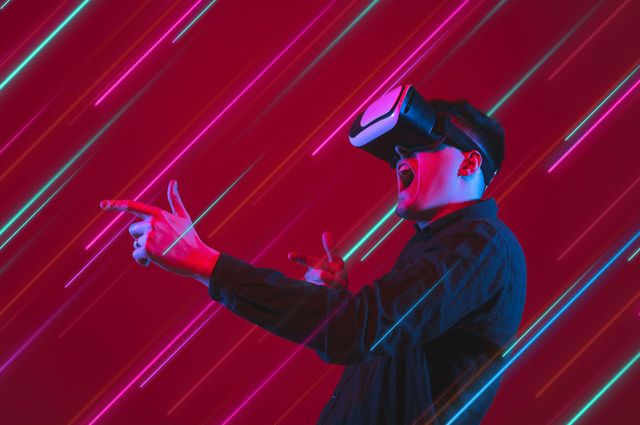What can the hospitality industry expect from metaverse?
10 experts shared their view
The recent announcement of Meta by Facebook along with Microsoft throwing their hat in the ring with Mesh is a clear indication of the virtual immersive experience that is coming to us faster than we anticipated. Maybe The Matrix is not so far in the future. However, even if the metaverse does not live up to the science-fiction dreams, it will become the key to digital experiences and a crucial element of the physical processes. While we can see immediate applicability of this technology in gaming and education, what can the hospitality industry expect from metaverse? In a world that offers "unprecedented interoperability", Avatars could play an increasing role in leisure travel. From bookings and service provisions to selling properties, AR/VR and Avatars may replace physical staff or even manage a front office. If this were possible, the labour challenges within the industry could encourage the adoption of the metaverse faster than we expect. The business travel industry is made up largely by MICE and MICE guests pay 17.5 % more than leisure guests. The metaverse has the capacity to transform MICE into a new age digitally immersive experience.
The question is, can the metaverse bring significant changes, solve some of the pressing issues and become the way forward for the hospitality industry?
Business opportunities: Is the Metaverse the right way to go?
Can the Metaverse bring significant changes, solve some of the pressing issues and become the way forward for the hospitality industry? Sure, it can! Can it do it within the next 5 to 10 years, as predicted by Zuckerberg? Hell, no. I've recently written a piece on the Metaverse (that can be found here), and my main argument is that the Metaverse can be (and will surely be) a goldmine for online microtransaction-centric industries (such as gaming), yet, we have to face the reality of the fact that VR/AR/MR traveling never really got mainstream, and this is something we all learned during last year's lockdowns. It's hard to sell a room if your guests can get out of their apartments. Sure, the Metaverse will probably play a role during the initial, top-funnel phases of the traveler's journey (choice of the destination/accommodation provider, for example). Still, if you want to enjoy that delicious meal in the terrace restaurant, you can only do it in the old, boring "meat space." More immediate applications can be, on the other hand, predicted in the MICE sector, as hybrid conferences are becoming the standard recently. An example? The same day this viewpoint is published, I will be talking at an event in Florence, Italy, as a hologram. COVID undoubtedly accelerated the adoption of tech, and even though I believe the embodied internet is the logical evolution of mobile internet, I doubt we'll be traveling (at least for leisure) as avatars in the near future. So my current POV on the Metaverse application for the travel industry is: 40% MICE, 10% leisure, 50% hype. As a futurist, I would love to be proven wrong.
It's going to be beautiful!!! We finally will see an evolution that will dwarf anything we have seen before. Fast is: People hate changing, but they love to escape. If there is one thing that Internet has shown us is that we are able to get away with anything and everything (generic usernames allow us to detach ourselves from the comments we make). Now how is that relevant for Hospitality and how will it leapfrog hospitality? Imagine going for a drink in the trendiest club in Paris to then jump and go shopping in New York, being able to have a meeting anywhere an everywhere. Whilst phase 1 of metaverse will be relatively boring, what comes after will be amazing: immersive experiences thanks to haptic feedback. This means that we can take hospitality home and therefore your favorite beachfront can be where you are and the only reason to go to a destination is to get the "real" deal. Exciting times ahead.
With the announcement of Meta's new ambitions (aka the Metaverse), a few doomsayers have been predicting the inevitable end of travel as we know it. I personally believe that we are very far off this kind of utopia (dystopia?). However, Augmented Reality and the metaverse are likely to bring the booking experience to a whole new level. During his Keynote in Paris last week, Gilles Maillet, Director of Travel & Mobility @Meta, discussed some of the many ways the metaverse will impact the customer journey in hospitality. One of the key takeaways is that, far from antagonizing hotels, Meta is planning to work in close conjunction with them in order to let guests experience the establishment before even setting foot in the property. Should this prediction of the future of the online hospitality market holds true, hotels should embrace it quickly in order not to be left behind.
Is the metaverse the perfect universe for misanthropes and germophobes, in other words, people who do not want to meet, mingle with and communicate in person with other people? Or is it a parallel universe enabling people to experience travel to far away destinations from the comfort of their reclining chair?
Let's start by saying that the metaverse is a 30-year old idea that was not invented by Mark Zuckerberg or Facebook. In 1992, science fiction author Neal Stephenson coined the term “metaverse” in his novel Snow Crash, in which he imagined a 3D virtual world where people, represented by avatars, could interact with each other and AI agents.
Different companies will probably create their own versions of the metaverse. Facebook, now renamed to Meta Platforms, and Microsoft have already announced that they are working on their own versions. Google, Apple and other tech giants around the world most probably will join the “metaverse rush.” The hope is that, similar to the Internet, all of these metaverse will be interconnected and you and your avatar can jump from one metaverse to another, similar to how now you can browse from one website to another.
On the surface, the metaverse is the ANTITHESES of travel. Travel is all about indulging your five senses: taste, smell, touch, hearing and sight. At best, the Metaverse can let you experience two of these: hearing and sight.
So how would the metaverse affect travel? One thing the metaverse and travel have in common is that both are social. This social aspect is central to understanding the metaverse, where people are represented by avatars and you can meet and interact with other people's avatars, but also with AI agents, bots and virtual agents. Similar to travel in the real world, your avatar can hang out with other avatars and plan and do things together.
Immersive video games and virtual concerts aside, here are a few metaverse applications I see emerging in travel and hospitality:
- Virtual and Hybrid Events: in place of the flat and boring Zoom meetings we have all attended over the past two years, the metaverse will allow you to attend and experience the industry conference or event in 3D graphics and sound and make make you feel (almost) as if you are present physically. Guest speakers and presenters can appear holographically and create a near real life impression. There is a caveat, of course. Having attended industry events for 30 years now, the main benefits from attending a live event come from personal, unscripted and often random interactions with other participants, not from officially scheduled general sessions, workshops, product presentations and meetings. How would the metaverse handle such interactions with both live and avatar participants remains to be seen.
- Virtual Trips to new and far away destinations: using a virtual reality headset, you can “fly” to a destination without l leaving your couch, immerse yourself in the local life, visit attractions and museums, attend local concerts and sporting events, meet and interact with locals and other visitors, and have fun. Kind of. The caveat is that you experiences will be limited to seeing and hearing, and you will not be able to indulge your other three senses: taste, smell and touch.
- Virtual Business Trips and Sales Meetings: you can have a holographic version of yourself take a virtual business trip, present your case, discuss terms and even sign new contracts. The caveat is whether your 'virtual self” will be able to establish rapport and build trust with your live counterparts. Anybody who has been in sales can vouch for the fact that building rapport and trust, in addition to great products and service, are the main reasons why you win a new client.
In my view, in spite of all the hype, the metaverse will have only marginal applications in travel and hospitality in the near to midterm.
I don't think the metaverse (also known simply as virtual reality) will change much to travel and hotels as solely virtual experiences. I believe it will become a way for guests to check out the hotel or destination before traveling - maybe making reviews less relevant because they can "go and see it" and possibly interact with the staff.
In the last 100 years our ability to virtually experience destinations has increased with TV, movies, Videos etc. Rather than satisfying our desire to travel this increased it, which is why I believe VR (because for the moment I can't tell the difference) will increase real travel.
Despite the bad events we need to attend, despite the complaints that business travel is a chore - we travel because we want to, rarely because we must. So in summary, I think the main category to be disrupted by VR/metaverse is peer reviews.
The impact will not be immediate, but within the next 10 to 15 years, the metaverse will have significantly influenced the hospitality industry. At the moment, it may seem like a giant technological leap that only a few top-tier hospitality organisations will be able to leverage. However, remember the times when social media was new to the world? Only a few companies were using Facebook and other platforms to expand their reach. Today, it has become mandatory for every company to incorporate social media, and the metaverse will follow the same trend.
After all, the hospitality industry is built on people engagement and social interactions. When the metaverse becomes the new way of socialising, hospitality organisations will have to incorporate it in order to expand their reach and stay relevant.
As it gains importance, will metaverse alter hospitality as we know it? I doubt that it will affect leisure travel demand. People, especially the newer generations, expect leisure to be an experience beyond their everyday “screen-based” lives, and they will continue to physically travel. Business travel, on the other hand, can be transformed into a more convenient experience through the metaverse. Exhausting back and forth travel and infamously boring Zoom calls can be replaced with more engaging, interesting, and convenient metaverse meetings. Such meetings would inevitably cut down on the number of business travellers.
This change would expand to include the MICE sector as well. Thought sharing on a global level would become the norm, and hospitality organisations can step in to host these events. Moving a step further, hotels can embrace the opportunities of immersive experiences and create their own experience rooms. They can offer new metaverse-based services, hosting global events from music concerts to conferences, leveraging the metaverse to cater to an international customer base.
The metaverse help break the “walls” between humans and machines. Using avatars can “humanize” the robotic services that hotels offer. On the one hand, travelers preferring human interactions with real service staff would feel less reluctant to the automatic services provided by avatars. On the other hand, hotels can address the labor shortage challenge by replacing labor-intensive positions with machines/robots. Using AI-powered avatars can further eliminate the variations in service operations caused by humans' individual factors.
Besides creating an immersive digital experience for the hotel guests, the metaverse can also become a virtual workspace for hotel staff. For example, hotels can offer flexible, work-from-home schedules in the metaverse that today's workforce demands. Metaverse may come sooner to the hospitality industry than we anticipate today.
The metaverse holds many promises, but I think we need to take a deep breath and not expect anything tangible before another couple of years, at best. So it won't solve the pressing issues, in particular shortage of labor, which is here to stay but is also expected to resolve itself somewhat by 2030, when demographics become favorable once again.
In the meantime, the best way to envision what the metaverse may or may not look like in travel in a couple of years from now is to look at what's happening in the gaming industry. We are seeing users splurge insane amounts of money on their avatar simply to compete with friends and total strangers alike. Concerts taking place with Ariana Grande, Travis Scott or Marshmello, bringing in real money through filters and lenses sold in parallel with such event.
Travel and hospitality brands could come up with similar "packages" when visiting virtually a destination, or attending a festival with friends. Some of these friends may actually "really" be at the festival while others attend virtually, through a hologram for example, and their avatar.
Far-fetched? For now, it seems so. But these technologies are already here. What's missing is the path, or highway that will support these initiatives. And these are already on the way, as well, with Facebook (Meta) jumping into the fray now.
It will be interesting to see how all of this pans out, but I don't see it happening for another 5-7 years, at best. Prove me wrong, though, and I will gladly join in :-)
The recent video launch of Metaverse by Mark Zuckerberg will trigger the ultimate failure of this toxic social media behemoth (in my humble opinion). The hospitality industry is a precious business sector that enriches lives through the visceral joy of travel, food, wine and culture. We already have planet earth in our universe and it is more amazing than we could ever experience fully. Just look at the 'Inspired by Iceland' youtube channel and their 'Introducing the Icelandverse' video to appreciate how ridiculous the Metaverse concept is vs reality.
“Within the next decade the metaverse will reach 1 billion people” that's the bold prediction from Meta and if it is true then the sheer scale of that audience means there are going to be significant opportunities for travel and hospitality. Travel planning is one, being able to see inside your hotel room or being able to walk around the hotel's amenities as if on a live tour of the hotel would help sell the experience of the stay to potential guests. Consider a digital concierge that can offer recommendations for restaurants, attractions, etc. or a check-in process that happens in the metaverse via a digital front desk. It's easy to see how this could help hotels address the labor shortage by making these remote/metaverse positions. The other obvious application for hotels is the events industry, the ability to fully combine in-person with remote/metaverse would substantially improve hybrid conferences where there is a mix of in-person and remote attendees. I would anticipate luxury properties in Dubai, New York and London being the early-adopters of the metaverse since it is hyper-personalized and experiential and those are key trends in luxury travel.
Assuming the metaverse gets traction, I could see a future demand for meta-hotels. Or interior design layouts for your meta-home that are styled from high-end hospitality brands and sponsored as such e.g. you could pay a fee to have your metaverse 'home' transformed to a Four Seasons Resort. In the future you may even be willing to pay for a 'digital stay' in a luxury resort that exists purely in the metaverse, the advantage for the hotel? No housekeeping if it's digital!










